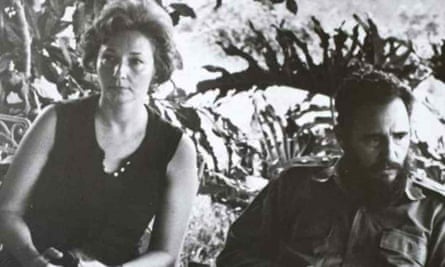Juanita Castro, one of the younger sisters of the revolutionary Cuban leaders Fidel and Raúl Castro, was initially active in her brothers’ struggle against the US-backed Batista regime. However, she turned against them soon after they came to power in 1959.
According to her 2009 memoir, Fidel and Raúl Mis Hermanos: La Historia Secreta, co-written with María Antonieta Collins, Juanita began to collaborate with the CIA from 1961, as it made attempts to overthrow the Castro regime.
Coming from a traditional Catholic background, without the educational opportunities of her brothers, Juanita, who has died aged 90, had become openly hostile to the ever-radicalising revolution. Prior to the CIA involvement she opened a boarding house in the wealthy Havana suburb of Miramar to protect people who had fallen foul of the regime, as well as to prepare them for the flight into exile. Everyone knew of her counter-revolutionary activities, but she was protected by the presence in the house of her – and her brothers’ – mother, Lina.
After the Bay of Pigs invasion by Cuban exiles in April 1961, when Juanita was using her influence to secure the release from prison of several acquaintances, she was approached by her friend Virginia Leitão da Cunha, the wife of the Brazilian ambassador in Havana, who suggested that she might find this humanitarian work easier if she were to be supported by the CIA.
Juanita flew to Mexico City that June, where she was interviewed by Tony Sforza, the organiser of Operation Mongoose, a CIA project designed, according to President John F Kennedy’s directive, “to help the people of Cuba overthrow the communist regime in Cuba from within Cuba”.
Juanita was the project’s first recruit. With the codename Donna, she returned to Havana, where a short-wave transmitter was installed in her house. Playing Marchetti’s Fascination Waltz indicated that an important message might be expected, while Puccini’s Madame Butterfly suggested that there was no news.
She continued her work of rescuing people from prison, but she came to the notice of the Cuban intelligence services. When Lina died in 1963, Juanita’s protection also disappeared. Raúl visited her with a large folder containing an account of her misdemeanours, and she felt that this was a warning she could not ignore. She arrived in Mexico in June 1964, creating headlines around the world when she attacked her brother’s government.

Juanita settled into a typical exile life in Miami, feted by some and attacked by others. For five years, she continued to enjoy the support of the CIA. But the inauguration of President Richard Nixon in 1969 led to a change of emphasis in US policy. Anxious to promote detente with the Soviet Union, the Americans agreed to downplay their anti-Cuban propaganda, while the Russians promised to use their best efforts to persuade Fidel to abandon the armed struggle in Latin America.
Juanita was the victim of this change, soon losing the CIA’s financia


